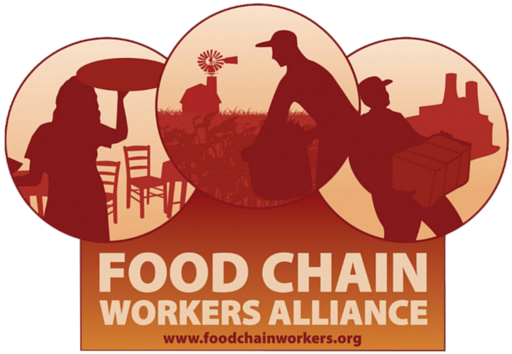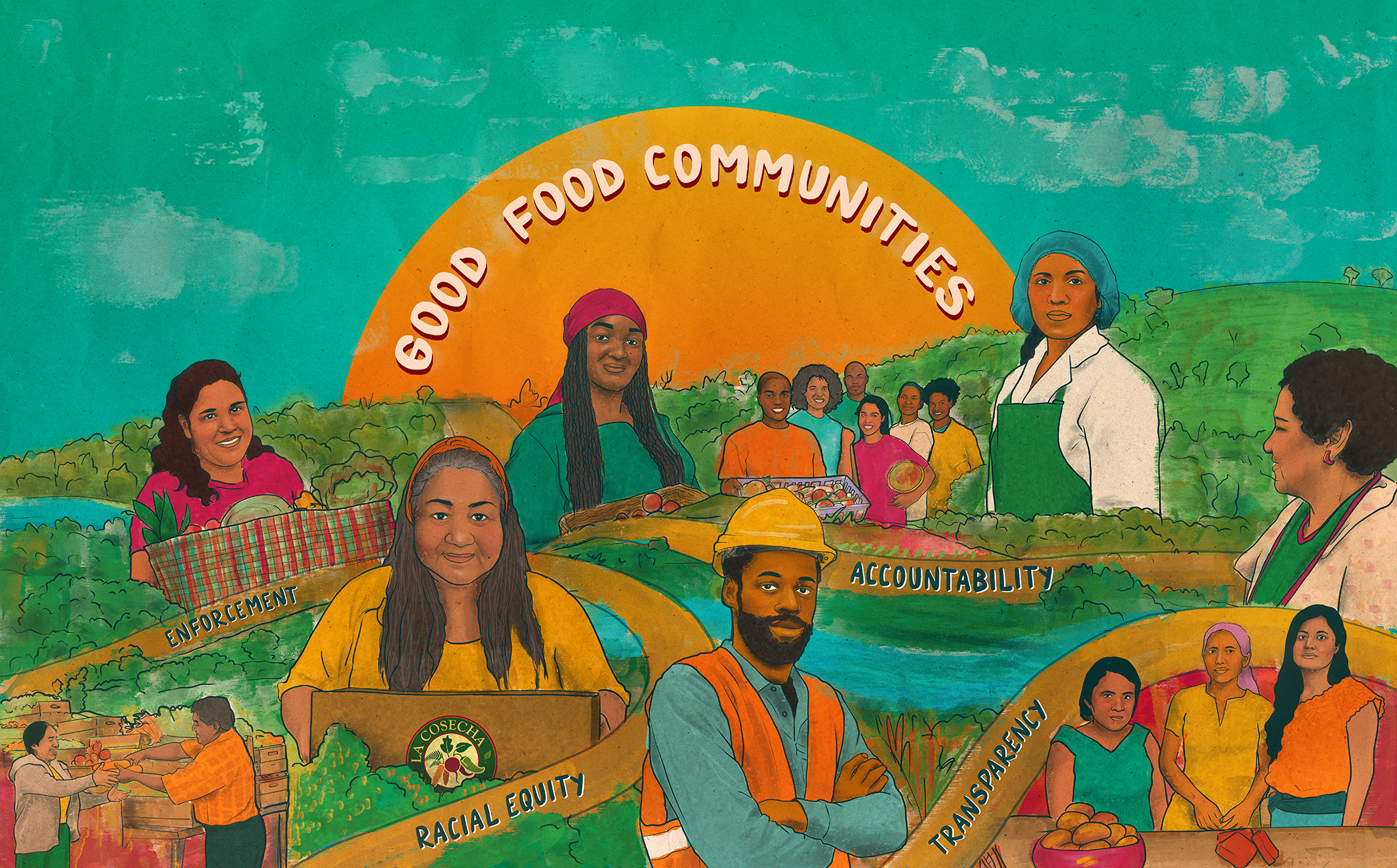New Report Exposes Corporate Control of Public Supply Chains and the Communities Reclaiming Them
español abajo
A new report released today from the Food Chain Workers Alliance and HEAL Food Alliance analyzes how grassroots leaders have won policies in 10 U.S. cities that hold institutions accountable to purchasing food from suppliers who support people working on the frontlines, local communities, animals, and the environment – collectively influencing over $540 million in public food dollars.
Procuring Food Justice: Grassroots Solutions for Reclaiming Public Supply Chains distills lessons from a decade of organizing to offer advocates a new blueprint for leveraging a “values-based purchasing” strategy to challenge corporate control of public food and redirect billions of taxpayer dollars toward small producers, producers of color, and suppliers with fair labor practices.
“This new analysis reveals how just a handful of corporations have seized near-total control of our public supply chains so they can rake in profits while paying workers poverty wages, putting lives at risk with hazardous working conditions, and retaliating against workers who exercise their right to organize,” said Christina Spach, Food Campaigns Director at the Food Chain Workers Alliance. “This report outlines opportunities for leveraging public contracts to hold these corporations accountable. In order for public contracts to reflect public values, we must demand transparency from suppliers and establish consequences for companies that do not follow fair labor practices.”
“Three out of five kids rely on the food served in public schools, and they deserve food systems that support them, not entrench them in the current state of inequality” said Jose Oliva, Campaigns Director at HEAL Food Alliance. “These massive food corporations are using taxpayer dollars to increase their own profit margins at the expense of our children, working people, and the planet. The solutions detailed in this report show that it is possible to get quality, nutritious, and sustainable food into schools and other public feeding programs – where kids and families need it most.”
The report draws on the testimonies of organizers and advocates on the ground, including surveys of 83 people working on the frontlines of production and warehousing; case studies with farmers, food aggregators, and processing plant workers; and 50 interviews with organizers, farmers, advocates, and academics. The report concludes that there are two primary needs for the future success of this work: supply chain transparency and real enforcement mechanisms.
“Our local work to implement values-based food procurement is only possible with meaningful support from our state government. New York has some of the most restrictive procurement laws in the country, so we are keenly aware that lowest bidder requirements are incredibly prohibitive and do not create enough space for food purchasing to be democratized across municipalities. Eliminating lowest bidder requirements and lifting barriers to values-based food procurement allows municipalities to make decisions about their institutional food purchasing needs that are aligned with the values of the communities they are serving.”
Ribka Getachew
Director of the NY Good Food Purchasing Program Campaign
Community Food Advocates
“I asked for the data [for procurement contracts]. Who bought from whom? Who ends up with the contracts? The three privileged white farmers that already had a monopoly on everything because they “work with organic methods.” Well, so do all of us [ACN’s Black, Indigenous and producers of color], but because they had that longevity of farming, they also had the capital, the land, the resources, the labor, and they had their white skin privilege.”
Helga Garcia-Garza
Director of Agri-Cultura Co-operative Network
The full report is available at: procuringfoodjustice.org
_____________
El Nuevo Reporte Expone el Control Corporativo de Las Cadenas Públicas de Distribución de Suministros y las Comunidades que las Reclama.
Un nuevo reporte publicado hoy por Food Chain Workers Alliance y HEAL Food Alliance analiza la manera que los líderes de base han ganado políticas en 10 ciudades de EE.UU. que tiene instituciones responsables para comprar alimentos de los proveedores que apoyan a las personas trabajando en las primeras líneas, las comunidades locales, los animales, y el medio ambiente – colectivamente influyendo más de $540 millones en dólares de alimentos públicos.
Adquirir la Justicia Alimentaria: Soluciones de Base para Reclamar Las Cadenas Públicas De Distribución destila lecciones de una década de organizar para ofrecerle a los promotores un nuevo plan para potenciar la estrategia “comprar basado en valores” para retar el control corporativo de los alimentos públicos y redirigir miles de millones de dólares de contribuyentes hacia pequeños productores, productores de color, y proveedores con practicas laborales justas.
“Este nuevo análisis revela cuánto un manojo de corporaciones han tomado un control casi total de nuestras cadenas públicas de distribución de suministros para que puedan embolsarse las ganancias mientras le pagan a los trabajadores sueldos de nivel de pobreza, poniendo a riesgo los derechos a organizar,” dijo Christina Spach, Directora de Campañas de Alimentos de Food Chain Workers Alliance. “Este reporte perfila las oportunidades para aprovechar los contratos públicos para hacer responsables a estas corporaciones. Para que los contratos públicos reflejen los valores públicos, tenemos que exigir transparencia de los proveedores y establecer consecuencias para las compañías que no siguen las prácticas laborales justas.”
“Tres de cada cinco niños dependen de los alimentos que se sirven en las escuelas públicas, y merecen sistemas de alimentos que los apoyen, no que los afiance en el estado actual de desigualdad,” dijo Jose Oliva, el Director de Campañas de HEAL Food Alliance. Estas corporaciones masivas de alimentos usan los dólares de los contribuyentes para aumentar su propio margen a costa de nuestros hijos, la gente trabajadora, y el planeta. Las soluciones detalladas en este reporte demuestran que es posible obtener alimentos de calidad, nutriente y sostenible en las escuelas y otros programas públicos de alimentación – en donde los niños y las familias más lo necesitan.
El reporte recurre de los testimonios de organizadores y de defensores sobre el terreno, incluyendo encuestas de 83 personas que trabajan en la primera línea de la producción y los almacenes; estudios monográficos con agricultores, agregadores de alimentos, y trabajadores de plantas de procesamiento; y 50 entrevistas con organizadores, agricultores, defensores, e investigadores. El reporte concluye que hay dos necesidades principales para el éxito de este trabajo en el futuro: la transparencia de la cadena de producción y mecanismos auténticos de responsabilidad.
“Nuestro trabajo de implementar la adquisición de alimentos basados en valores sólo es posible con apoyo significativo de nuestro gobierno estatal. Nueva York tiene una de las leyes de adquisición más restrictivas en el país, por eso estamos plenamente conscientes de que los requisitos más bajos del licitador son increíblemente prohibitivos y no crean espacio suficiente para que la compra de alimentos sea democratizada en las municipalidades. Eliminar los requisitos más bajos del licitador y levantar las barreras de la adquisición de alimentos basados en los valores le permite a las municipalidades tomar decisiones sobre su necesidad de compras de alimentos institucionales para que estén más alineadas con los valores de las comunidades que sirven.”
Ribka Getachew
Directora de NY Good Food Purchasing Program Campaign
Community Food Advocates
“Yo pedí la información [para los contratos de adquisición]. ¿Quién compró de quien? ¿Quién se queda con los contratos? Los tres agricultores blancos privilegiados que ya tienen un monopolio de todo porque ellos “trabajan con métodos orgánicos.” Pues, tambien todos nosotros [Las personas negras, indígenas y productors de color de ACN], pero porque han tenido la larga duracion de la agriculturas, tambien han tenido el capital, la tierra, los recursos, el labor, y han tenido el privilegio de su piel blanca.”
Helga Garcia-Garza
Directora de Agri-Cultura Co-operative Network
Puede encontrar el reporte completo en: procuringfoodjustice.org

